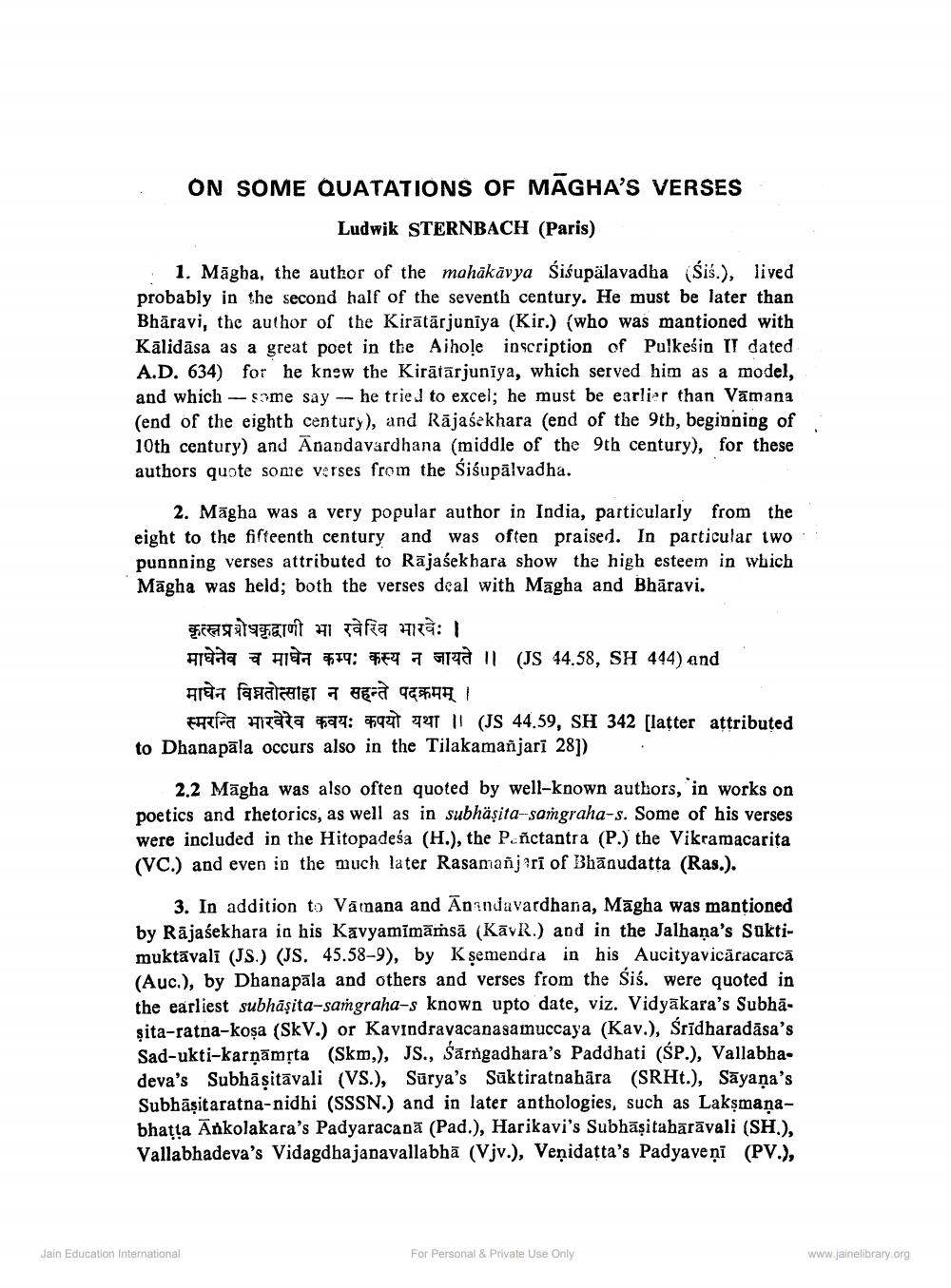________________
ON SOME QUATATIONS OF MĀGHA'S VERSES
Ludwik STERNBACH (Paris)
1. Māgha, the author of the mahākāvya Sisupälavadha (sis.), lived probably in the second half of the seventh century. He must be later than Bhāravi, the author of the Kirātārjunīya (Kir.) (who was mantioned with Kālidāsa as a great poet in the Aihole inscription of Pulkesin II dated A.D. 634) for he knew the Kirālārjuniya, which served him as a model, and which - some say - he tried to excel; he must be earlier than Vamana (end of the eighth century), and Rājasekhara (end of the 9th, beginning of 10th century) and Anaodavardhana (middle of the 9th century), for these authors quote some verses from the sisupälvadha.
2. Māgha was a very popular author in India, particularly from the eight to the fifteenth century and was often praised. In particular two punnning verses attributed to Rājasekhara show the high esteem in which Māgha was held; both the verses deal with Magha and Bhāravi.
कृत्स्नप्रबोधकृद्वाणी भा रवेरिव भारवः ।। Alana a hea 879: 469 7 11 (JS 44.58, SH 444) and माघेन विघ्नतोत्साहा न सहन्ते पदक्रमम् ।
Fra rata 497: 4927 741 1! (JS 44.59, SH 342 [latter attributed to Dhanapāla occurs also in the Tilakamañjarī 28])
2.2 Māgha was also often quoted by well-known authors, in works on poetics and rhetorics, as well as in subhäșita-samgraha-s. Some of his verses were included in the Hitopadeśa (H.), the Pañctantra (P.) the Vikramacarita (VC.) and even in the much later Rasamanjarī of Bhānudatta (Ras.).
3. In addition to Vámana and Anındavardhana, Māgha was mantioned by Rājasekhara in his Kavyamīmāṁsā (KāvR.) and in the Jalhana's Suktimuktāvali (JS.) (JS. 45.58-9), by Kșemendra in his Aucityavicāracarca (Auc.), by Dhanapāla and others and verses from the Siś. were quoted in the earliest subhāşita-sangraha-s known upto date, viz. Vidyakara's Subhāşita-ratna-koşa (SKV.) or Kavindravacanasamuccaya (Kav.), Śrīdharadāsa's Sad-ukti-karņāmsta (Skm), JS., Sārngadhara's Paddhati (ŚP.), Vallabhadeva's Subhāṣitāvali (VS.), Sürya's Sūktiratnahāra (SRHt.), Sāyaṇa's Subhāṣitaratna-nidhi (SSSN.) and in later anthologies, such as Lakşmaņabhatta Ankolakara's Padyaracana (Pad.), Harikavi's Subhāşitabarvali (SH.), Vallabhadeva's Vidagdha janavallabhā (Vjv.), Veņidatta's Padyaveņi (PV.),
Jain Education International
For Personal & Private Use Only
www.jainelibrary.org




